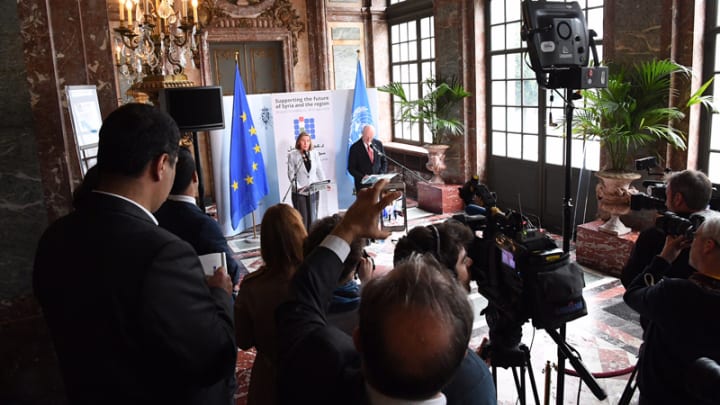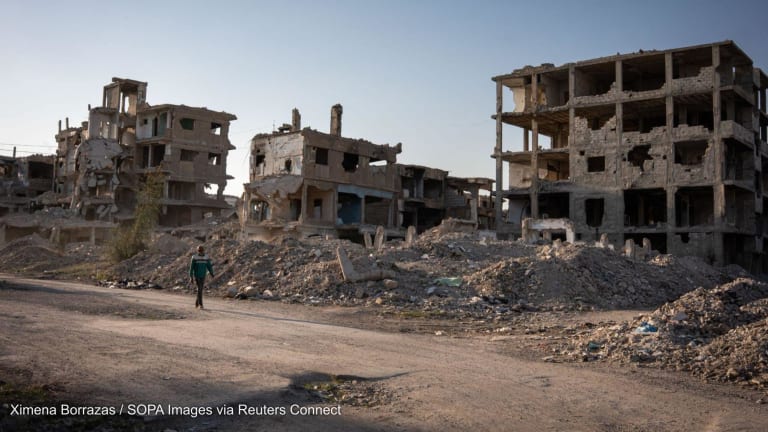
BRUSSELS — International donors have pledged $4.4 billion in aid for civilians in Syria and the surrounding area in 2018 at a conference in Brussels, far short of what the United Nations says is needed to provide humanitarian assistance there this year.
The two-day conference, which ran through Wednesday, featured more than 80 delegations, with participants also making multiyear pledges of $3.4 billion for 2019-2020. Development banks and donors announced loans worth around $21.2 billion, partly on concessional terms.
The U.N. estimates that at least $9.1 billion is required for aid in Syria and the region this year. Prior to the conference, just $2.3 billion of that was covered.
See more related topics:
► UNICEF starts 2018 with its largest appeal yet for humanitarian action
► Red Cross chief: 'Our job is always to push the limits of the possible'
► Ceasefire set for eastern Ghouta, but humanitarian solution still out of reach
A spokesperson for U.N. Office for the Coordination of Humanitarian Affairs said donors’ money usually went to the U.N.-coordinated response plans. However, donors are yet to communicate how they intend to allocate their pledges, meaning it is too early to sum up the outstanding funding requirements.
Mark Lowcock, U.N. under-secretary-general for humanitarian affairs and emergency relief coordinator, described the pledges as “a good start,” telling reporters “there is absolutely no question that without conferences of this sort ... things would be a lot worse.” Lowcock said the United States, which has been providing more than $1 billion annually to Syria and the region in recent years, could not yet confirm its support due to ongoing budget talks.
However, Oxfam dismissed the outcome as “tragically inadequate.” Pointing to “insufficient aid, not enough help for refugees, and no meaningful peace process,” Shaheen Chughtai, head of campaigns for Oxfam's Syria Crisis Response, said in a statement that “while some countries did step up with new money, overall, today's aid pledges fall short of what was promised last year to help the civilians bearing the brunt of the conflict.” Last year’s Brussels conference in support of Syria raised $6 billion for 2017.
Of this year’s 36 donors, the top contributors were Germany, which pledged $1 billion; the European Commission with $691 million; and the United Kingdom with $635 million.
German Foreign Minister Heiko Maas said his country’s contribution would go toward ensuring job prospects for refugees in Lebanon, Jordan, and Turkey, as well as humanitarian aid in Syria.
Penny Mordaunt, the U.K.’s secretary of state for international development, told the media that U.K. aid would be spent on medical supplies and training doctors and nurses.
“Unfortunately, even when we have had a ceasefire negotiated, we’ve had medical supplies stripped from the aid convoys that were supposed to be going in, and those convoys have been shelled,” Mordaunt said. “So this is incredibly difficult for aid workers, but we will continue to push for access, we will continue to do all we can to protect those people.”
Laura Thompson, deputy Director General at the International Organization for Migration, told the conference that “pressures and threats continue to prevent many of us from doing our work in a credible manner.”
She said that Syrians risk their lives each day to help assess the needs in the country, and that “the ability of the humanitarian community to do so continues to be undermined by parties to the conflict, which threatens our collective humanitarian response inside Syria.”
Some 13.1 million people need assistance in Syria, where a seven-year civil war has claimed hundreds of thousands of lives and displaced half the population. The 5.6 million Syrian refugees in neighboring countries were also on the agenda in a dialogue on Tuesday with 164 NGOs, including 15 from Syria and 72 from Jordan, Lebanon, and Turkey — the countries hosting the most refugees.
A statement from Syrian civil society argued that “the deterioration in the education sector is a primary threat to the present and future of the Syrian people.” Across the region, 35 percent of refugee children are not in school.
The organizations called for the recognition of Syrian certificates and the preservation of students’ cultural rights, including “their right to receive education in their mother tongue during their asylum period.”
World Vision’s Mark Chapple, who co-leads the multiagency No Lost Generation program supporting children affected by the crisis, praised Turkey for opening its schools to Syrian refugees but told Devex that the decision last year to withdraw the curriculum in Arabic meant many children also required additional language assistance from NGOs.
Chapple said Wednesday’s focus on longer term funding pledges was welcome, but that there was still a significant gap in overall funding and a need for a breakdown of which sectors and countries will receive what, as well as ensuring commitments are honored quickly.
“Some pledges from the previous conferences took up to eight months to realize,” he said. “This is unacceptable.”
Speaking to reporters on Wednesday, the EU’s foreign affairs chief, Federica Mogherini, called on Russia and Iran to pressure Damascus to negotiate a political end to the conflict under U.N. auspices.
Separate to humanitarian aid, Mogherini said money for reconstruction efforts will come only once a political process is “well underway under U.N. leadership.”




